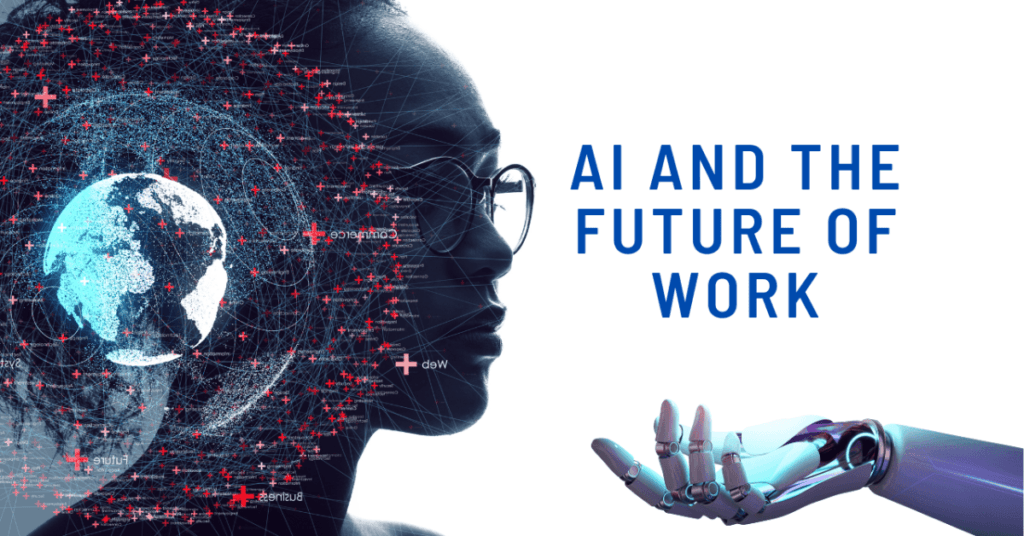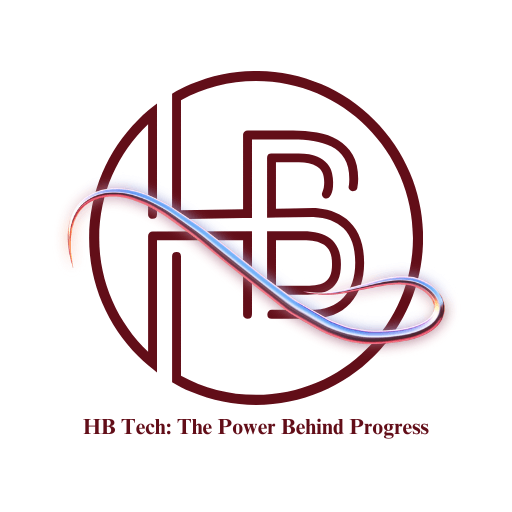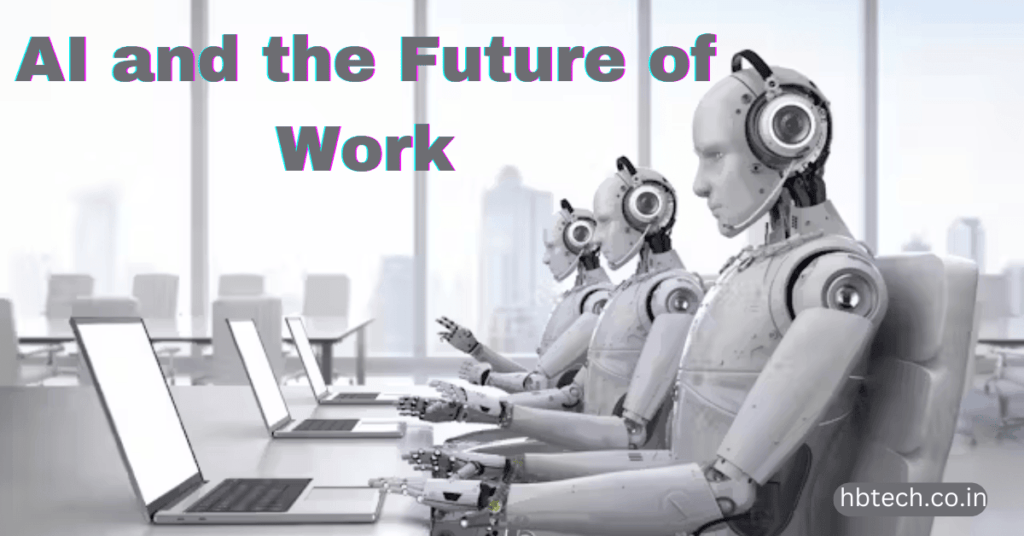As artificial intelligence (AI) continues to develop, its impact on the workforce becomes more significant. From automating tasks to helping people work more efficiently, AI is changing how we do our jobs. But with these changes come both exciting opportunities and important challenges. In this article, we’ll take a closer look at how AI is shaping the future of work, including insights from leading experts and research.

AI and the Future of Work in a Presentation
For many, the easiest way to understand AI’s role in the workplace is through a PowerPoint presentation. Key points typically covered include :
- AI Technologies : Examples of AI in action, such as chatbots, automation and data analysis tools.
- Changing Jobs : How AI will affect different jobs, from those that involve routine tasks to those that require more complex problem-solving.
- Skill Development : As AI changes industries, workers will need to develop new skills to stay relevant.
- Faster Decisions : AI can help businesses make better, faster decisions by analyzing large amounts of data quickly.
AI and the Future of Work in a Report (PDF)
For a more detailed look at AI’s impact, many prefer a PDF report that goes deeper into the subject. Key areas of focus in these reports often include:
- Economic Effects : How AI will affect productivity and economic growth in various industries.
- Job Changes : While some jobs may disappear, new opportunities are created as AI develops.
- Global Differences : AI adoption varies around the world, depending on infrastructure and resources in different countries.
Reports like these provide in-depth analysis with data, making them perfect for readers who want a more thorough understanding of the issue.
AI and the Future of Work in Podcasts
Podcasts are another great way to dive into AI and its effects on the workplace. Many podcasts feature experts discussing :
- AI in Different Industries : How AI is transforming fields like healthcare, finance and education.
- Ethics : The ethical dilemmas surrounding AI, such as privacy concerns and potential biases in algorithms.
- Employee Experience : How AI is affecting workers and what this means for their roles in the workplace.
- Leadership in AI : How business leaders can adapt to and lead in a world where AI is central to operations.
AI and the Future of Work: Key Takeaways
Opportunities:
- Increased Efficiency : AI can take over repetitive tasks, allowing employees to focus on more meaningful and creative work.
- New Roles : As AI changes industries, new jobs and career paths are emerging that focus on technology, data, and AI management.
- Global Collaboration : AI can help companies work together across borders, improving communication and efficiency.
- Better Decision-Making : AI can analyze data quickly and accurately, supporting better business decisions.
Challenges:
- Job Loss : Automation and AI may replace some jobs, requiring workers to adapt and learn new skills.
- Bias in AI : Algorithms may reflect biases in their training data, leading to unfair outcomes.
- Ethical Concerns : As AI grows, questions around privacy, job displacement and control over AI systems need to be addressed.
- Resistance to Change : Some workers may feel threatened by AI and automation, which can lead to reluctance and workplace anxiety.
Navigating these opportunities and challenges will require cooperation between businesses, workers and governments to ensure a balanced and fair transition to an AI-driven future.
AI and the Future of Work in Africa
In Africa, AI holds particular promise. The continent faces many challenges, such as high youth unemployment and rapid urbanization, but AI can help address these issues by :
- Creating Jobs : AI can open new industries and job opportunities in fields like healthcare, agriculture, and education.
- Improving Efficiency : AI can help manage resources better, optimize supply chains, and improve public services.
- Education and Training : By embracing AI, Africa can equip its workforce with the skills needed for the digital economy.
However, AI adoption faces challenges like limited infrastructure and digital literacy. Overcoming these hurdles will require support from governments, the private sector and international organizations.
AI and the Future of Work: Insights from Dan Turchin
Dan Turchin, an expert on AI and human resources, has offered valuable perspectives on AI’s role in the workplace. He believes that AI should be seen as a tool to enhance worker’s capabilities, not replace them. AI can help automate routine tasks, allowing employees to focus on higher-value work. Turchin also points out that AI can improve employee well-being by providing personalized support and reducing administrative tasks.
AI and the Future of Work: Reports from the National Academies
The National Academies of Science, Engineering and Medicine have published research on how AI will affect the workforce. Their reports stress:
- Education : Workers need to be prepared for AI’s impact through better education and training programs.
- Ethics and Regulations : Governments should create ethical guidelines and laws around the use of AI to protect privacy and fairness.
- Inclusive Growth : It’s important that AI benefits everyone and not just those in wealthy or technologically advanced countries.
AI and the Future of Work: McKinsey’s Research
McKinsey & Company has conducted studies on how AI will affect jobs and industries. Their research highlights :
- Disruption and Opportunity : While AI will disrupt traditional business models, it also offers opportunities for economic growth and job creation.
- Skills for the Future : There will be a high demand for new skills in AI management, data science and machine learning.
- Strategic Planning : Companies need to implement AI strategies that align with long-term goals while ensuring that AI adoption is smooth and sustainable.
AI is transforming the world of work in profound ways. It brings new opportunities for growth, efficiency and job creation, but also presents challenges that need careful management. From enhancing productivity to reshaping job roles, AI is here to stay. By preparing for these changes—through education, ethical considerations and strategic adoption—we can ensure that AI benefits workers and businesses alike. The future of work is evolving and AI will be at the center of that transformation.
Frequently Asked Questions(FAQs)
How will AI impact jobs in the future?
AI will significantly change the workforce, automating repetitive tasks and creating new job opportunities. While some jobs may be replaced by AI, others will emerge, particularly in fields like AI management, data science and machine learning. Workers will need to adapt by developing new skills, particularly those that complement AI technologies, such as creative problem-solving and strategic thinking.
What are the challenges AI poses to the workforce?
AI brings several challenges, including potential job displacement due to automation, ethical concerns around data privacy and biases in algorithms and resistance from workers who fear job loss. Companies will need to invest in upskilling and reskilling workers, ensure ethical AI practices and address concerns about AI’s impact on jobs and privacy.
How can AI benefit Africa’s workforce?
AI has the potential to create new job opportunities in Africa, particularly in sectors like healthcare, agriculture and education. It can also help improve efficiency in resource management, optimize supply chains and enhance public services. However, AI adoption in Africa faces challenges like limited infrastructure and digital literacy, which will require collaboration between governments, businesses and international organizations to overcome.
Related Posts
- How to do Paytm Full KYC || From your mobile at home
- What’s app Privacy Policy : What’s App got angry || See what What’s App said…
- WhatsApp Banking : How to Check Bank Balance Through WhatsApp
- How Many SIM Cards are Activate with my Aadhar
- Exploring the World of ChatGPT: A Comprehensive Guide
- Canva: Your One-Stop Shop for All Things Design









